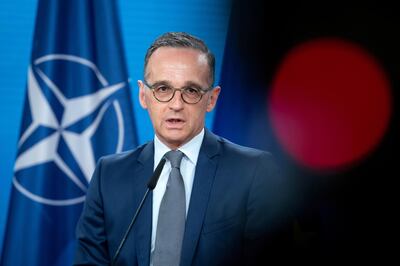The EU should update its migration pact with Turkey in a deal that would involve giving more money to Ankara, Germany's Foreign Minister has said.
Under the 2016 deal, Turkey agreed to stem the number of migrants entering Europe in return for financial support to look after refugees in Turkish territory.
The pact has been criticised and a dispute erupted last year after Turkey allowed thousands of people to enter Greece.
But Germany's Heiko Maas told Die Welt newspaper that the deal should be updated.
“Despite all the difficulties that we’ve had with the Turkish government, we have to recognise that the country has taken on a not insignificant migration burden for us,” he said.
“I believe that we in the EU have a great interest in developing and updating the migration pact with Turkey.”
Asked whether the funding for Turkey would be similar to the €6 billion ($7.13bn) agreement in 2016, he said: “I don’t want to put any numbers out there but it’s fully clear that it won’t work without money."
Mr Maas said the relationship between Europe and Turkish President Recep Tayyip Erdogan was relatively constructive after a stormy period.
He said that closer ties on issues such as visas and customs would require progress on human rights and the rule of law in Turkey.
The migration pact was criticised by rights groups who say Turkey is not safe for migrants and refugees, and Ankara has been accused of sending refugees back to Syria.

Th EU struck the deal with Turkey after a surge of refugees from Syria and Iraq caused a crisis in Europe in 2015.
The agreement provides for illegal migrants to be returned from Greek islands to Turkey, while Ankara is subsidised to look after them.
Turkey hosts about four million refugees, most of them from Syria.
The 2016 pact called for renewed talks on Turkey’s long-standing aim of joining the EU.
Mr Erdogan said in April that Ankara remained committed to EU membership despite strains with the bloc in recent, years but its application continues to stall.
Germany's ruling conservatives said in an election manifesto published on Monday that they would not allow Turkey to join.
“Turkey is moving further away from fulfilling the EU’s accession criteria, such as democracy, the rule of law and respecting human rights,” the CDU/CSU bloc said.
“With us, there will be no full membership of Turkey in the EU. Instead we will agree on a close partnership.”


